(单词翻译:单击)
Confucianism in the Pre-Qin Period
先秦的儒家思想
The Confucian School was founded by Confucius in the Pre-Qin Period, which was later developed by Mencius and Xun Zi, and became one of the most influential schools of thought of the time.
儒家学派在先秦时期由孔子创立,后经由孟子和荀子发展,成为了那个时代最具影响力的学派之一。
The greatest advantage of Confucian studies lies in its reliance on traditional Chinese culture represented by The Five Classics, thus manifesting the characteristics of “classical culture”.
儒家思想的最优之处在于其对于中国传统文化的依赖,“五经”就是一个代表,所以它表现了“古典文化”的特征。
The Five Classics were the yeast of the thoughts of the Confucian School, which centered upon their explanation and interpretation, changing and renewing its theories with the times.
“五经”是儒家学派的发酵产物,它以解释与翻译为主,随着时代的变化改变与更新理论。

Another characteristic feature of Confucianism is its keen understanding of the nature of the patriarchal society in ancient China, and the defense of this patriarchal culture then. That is why Confucianism has become a theoretical system which best reflects.
儒家思想的另一特点是其对于古代中国父权社会的深刻理解以及之后对于父权文化的反对。


